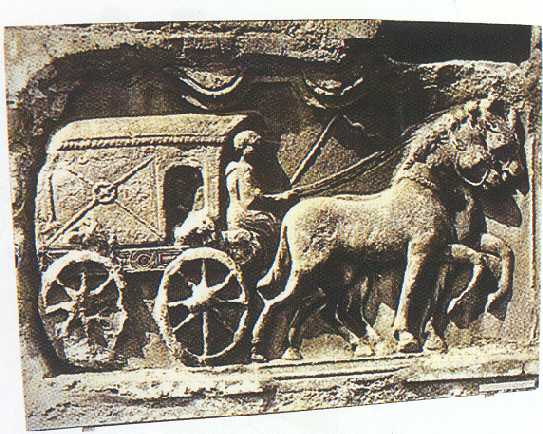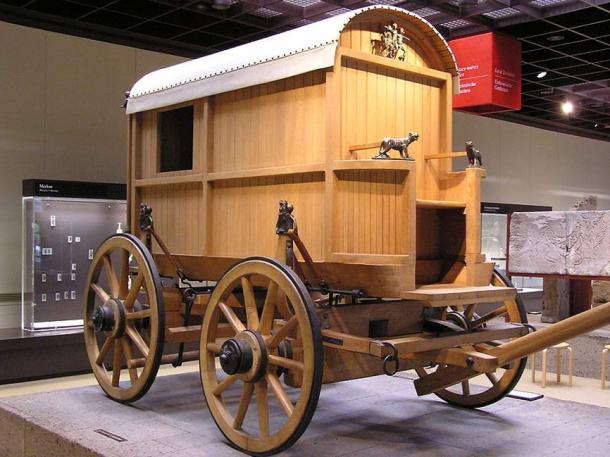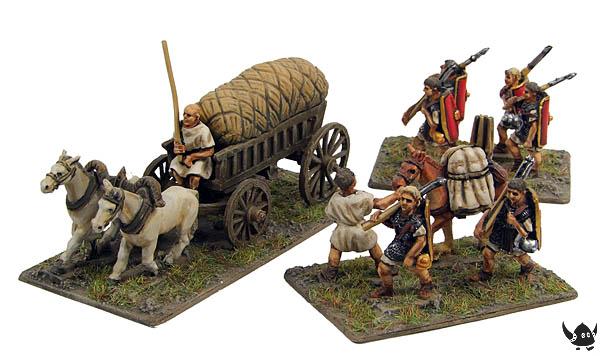- May 19, 2015
- 125,492
- 28,588
- 73
- Country
- United States
- Faith
- Christian
- Marital Status
- Single
- Politics
- US-Libertarian
I couldn't find a thread on this topic so I decided to create one
NT verses showing horses and chariots. There are actually 2 different Greek words used in Revelation for "chariot" which I have never noticed before.
Reve 9 appears to show battle chariots while Reve 18 is a type of wagon/carriage for carrying people and supplies?
Discuss........
716. harma har'-mah probably from 142 (perhaps with 1 (as a particle of union) prefixed); a chariot (as raised or fitted together (compare 719)):--chariot.
G716 matches the Greek ἅρμα (harma), occurs 4 times in 4 verses
Act 8:28 was returning. And sitting in his chariot, he was reading Isaiah the prophet.
Act 8:29 Then the Spirit said to Philip, “Go near and overtake this chariot.”
Act 8:38 So he commanded the chariot to stand still. And both Philip and the eunuch went down into the water, and he baptized him.
Revelation 9:9 And they had breastplates like breastplates of iron, and the sound of their wings was like the sound of chariots<716> with many horses running into battle.
=================================
Revelation 18:8 Thru this in one day shall be arriving<2240> Her blows, death and sorrow and famine. And in fire She shall be utterly burned<2618>,that strong Lord the GOD, the One judging Her.
9 And shall be lamenting<2799> over Her and shall be grieving/smiting selves<2875> over Her the kings of the earth,those with Her committing whoredom and indulging whenever they may be beholding<991> the smoke of Her firing<4451>.
10 From afar<3113> having stood because of the fear of the tormenting<929> of Her saying "Woe! woe! the great City Babylon! the strong City! That to one hour came the judging<2920> of Thee.
11 And the Merchants<1713> of the land are lamenting<2799> and mourning<3996> over Her, that their cargo<1117> no one is buying anymore.
12 Cargo of gold and silver, and precious stone and pearl and fine linen and purple, [Luke 16:19/Revelation 18:16] and silk, and scarlet, and all thyne wood, and every vessel of ivory, and every vessel of most precious wood and brass and iron and marble 13 and cinnamon, and odours, and ointment, and frankincense, and wine and oil and fine flour and wheat and cattle and sheep
4480. rheda hred'-ah of Latin origin; a rheda, i.e. four-wheeled carriage (wagon for riding):--chariot.
and of horses and of chariots<4480> and of bodies and souls of men.
14 ‘And the fruition<3703> of Thee of the yearning of Thy soul passed away<565> Thee,
and all the dainty and the splendid things perished<622> from Thee, and no longer not no Thou shall be finding them. 15 The Merchants of these, those being rich from Her,
from afar<3113> shall be standing, because of the fear of Her torment<929>, weeping<2799>, and mourning<3996>,
=============================================
In the next posts, we will explore their usage in the OT and put up commentaries.....
NT verses showing horses and chariots. There are actually 2 different Greek words used in Revelation for "chariot" which I have never noticed before.
Reve 9 appears to show battle chariots while Reve 18 is a type of wagon/carriage for carrying people and supplies?
Discuss........
716. harma har'-mah probably from 142 (perhaps with 1 (as a particle of union) prefixed); a chariot (as raised or fitted together (compare 719)):--chariot.
G716 matches the Greek ἅρμα (harma), occurs 4 times in 4 verses
Act 8:28 was returning. And sitting in his chariot, he was reading Isaiah the prophet.
Act 8:29 Then the Spirit said to Philip, “Go near and overtake this chariot.”
Act 8:38 So he commanded the chariot to stand still. And both Philip and the eunuch went down into the water, and he baptized him.
Revelation 9:9 And they had breastplates like breastplates of iron, and the sound of their wings was like the sound of chariots<716> with many horses running into battle.
=================================
Revelation 18:8 Thru this in one day shall be arriving<2240> Her blows, death and sorrow and famine. And in fire She shall be utterly burned<2618>,that strong Lord the GOD, the One judging Her.
9 And shall be lamenting<2799> over Her and shall be grieving/smiting selves<2875> over Her the kings of the earth,those with Her committing whoredom and indulging whenever they may be beholding<991> the smoke of Her firing<4451>.
10 From afar<3113> having stood because of the fear of the tormenting<929> of Her saying "Woe! woe! the great City Babylon! the strong City! That to one hour came the judging<2920> of Thee.
11 And the Merchants<1713> of the land are lamenting<2799> and mourning<3996> over Her, that their cargo<1117> no one is buying anymore.
12 Cargo of gold and silver, and precious stone and pearl and fine linen and purple, [Luke 16:19/Revelation 18:16] and silk, and scarlet, and all thyne wood, and every vessel of ivory, and every vessel of most precious wood and brass and iron and marble 13 and cinnamon, and odours, and ointment, and frankincense, and wine and oil and fine flour and wheat and cattle and sheep
4480. rheda hred'-ah of Latin origin; a rheda, i.e. four-wheeled carriage (wagon for riding):--chariot.
and of horses and of chariots<4480> and of bodies and souls of men.
14 ‘And the fruition<3703> of Thee of the yearning of Thy soul passed away<565> Thee,
and all the dainty and the splendid things perished<622> from Thee, and no longer not no Thou shall be finding them. 15 The Merchants of these, those being rich from Her,
from afar<3113> shall be standing, because of the fear of Her torment<929>, weeping<2799>, and mourning<3996>,
=============================================
In the next posts, we will explore their usage in the OT and put up commentaries.....




